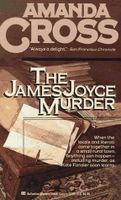 jmc had a post the other day about academics writing genre fiction, in which she mentioned Joanne Dobson's Karen Pelletier mysteries. I vaguely remembered reading a few mysteries some time ago by author Amanda Cross, and I seemed to remember that they were set in an academia environment.
jmc had a post the other day about academics writing genre fiction, in which she mentioned Joanne Dobson's Karen Pelletier mysteries. I vaguely remembered reading a few mysteries some time ago by author Amanda Cross, and I seemed to remember that they were set in an academia environment. A quick google later, and I had confirmed that yes, indeed, Amanda Cross was an academic. Her real name is Carolyn Gold Heilbrun, and she started writing mysteries while teaching at Columbia. I was interested to read in one of the links I found that "Heilbrun did not reveal that she was Amanda Cross until after she got tenure at Columbia--and was the first woman in the English Department to do so." I was also interested to hear Heilbrun described as a "feminist scholar" and the main character of her mystery series, Kate Fansler, described as "a feminist middle-aged literature professor at a University in Manhattan".
After reading this, I needed to give her books a try again! Fortunately, I'd kept them (back of the bottom shelf, but still), so I started with the earliest one I had, the second book in the series, The James Joyce Murder, which was also voted by readers as their favourite.
What can be more idyllic than a summer in the Berkshires, sorting through James Joyce's letters to his publisher? What could be more peaceful than long walks in the woods with friends old and new?I wasn't particularly convinced by the mystery, but the characters were so interesting and fun and witty that I did enjoy the book. A B.
Well, just about anything. Kate Fansler finds that literary ability and love of nature are far less vital than super sleuthing skill when her next-door neighbor is murdered - and all her houseguests are prime suspects...
Kate Fansler doesn't usually "do" country living, but this summer finds her isolated in a country house in rural Massachussets. An old friend has asked her to go through her late father's correspondence, and since said father was a very important editor, the man who first published writters like James Joyce in the US, Kate finds this request tempting indeed. So off she goes to the editor's country house, accompanied by Emmet, a graduate student from the University where she is an English professor.
Kate doesn't "do" kids, either, but she's joined in the country by her nephew, Leo. Leo hasn't been doing well in school, so Kate's brother has asked her to take him on for the summer. Leo is accompanied by William, yet another grad student from Kate's university, who's supposed to watch him and tutor him throughout the summer.
And the people keep arriving... Reed Amhearst, who's Kate's lover and has began to want something more and Eveline (or was it Evelina?) and Grace, two more professors. By the time an unpleasant, malicious neighbour is murdered, in circumstances which involve Kate's household, that household (and all the nearby households occupied by "summer people") are full to the gills with potential suspects.
What I loved best about this book was the characters and their interactions. These are all truly interesting people, and even when there wasn't much going on, following their minds as they wandered around was fascinating. And when they talk, their dialogue sparkles. They do tease in the book about how, unlike in the mysteries they read, nothing really happens there and they just talk and talk. But what talk!
Also interesting to me was the fact that the book was written in the late 60s, and this shows. Certain things especially, for instance, the whole way Kate's household causes amazement in everyone (I just couldn't understand what was so shocking about it), or that thing about William's celibacy, just felt off to my contemporary eyes, but it was interesting anyway. I do get the feeling Kate and her friends would have been considered pretty modern for their times, so it was less of a culture shock for me to read.
I also enjoyed what turned out to be the relationship between the murder and the James Joyce papers. At one point, I wondered why the title of the book was The James Joyce Murder, since I just couldn't imagine how the two could be related. However, Cross manages to tie them in quite neatly, which was fun.
The main problem I had with the book was actually related to the murder, and it was quite a big one. I thought Cross didn't really succeed in showing why the victim was such a monster. I mean, everyone seemed to be really blasé about her death, seeming to to think she deserved it, and, when we find who the murderer was, the attitude is that this person was justified in killing her. Ok, but what Cross showed us readers about the victim (as opposed to merely telling us), was a woman who was, at worst, annoying, but someone who just didn't have enough power to inspire such hate from everyone. This was a bit puzzling.
Still, I enjoyed the book. It was a fun, quick read and I'll probably give the two others I have a reread, at some point.
BTW, someone mentioned in one of the amazon reviews that if you enjoy this book, you should try Sarah Caudwell. Has anyone read her?
No comments:
Post a Comment